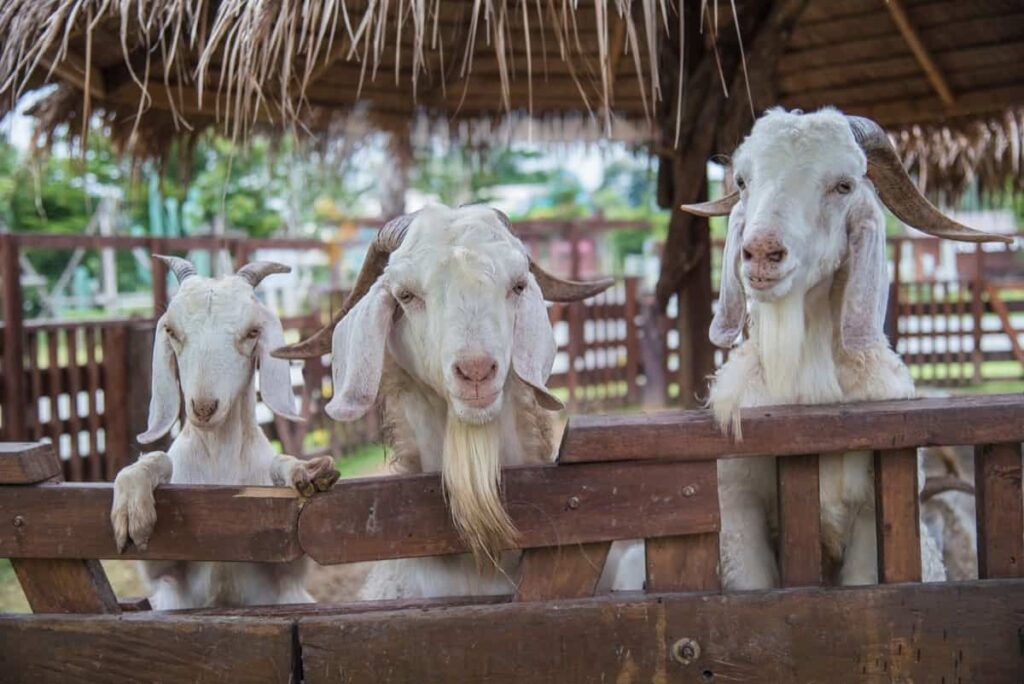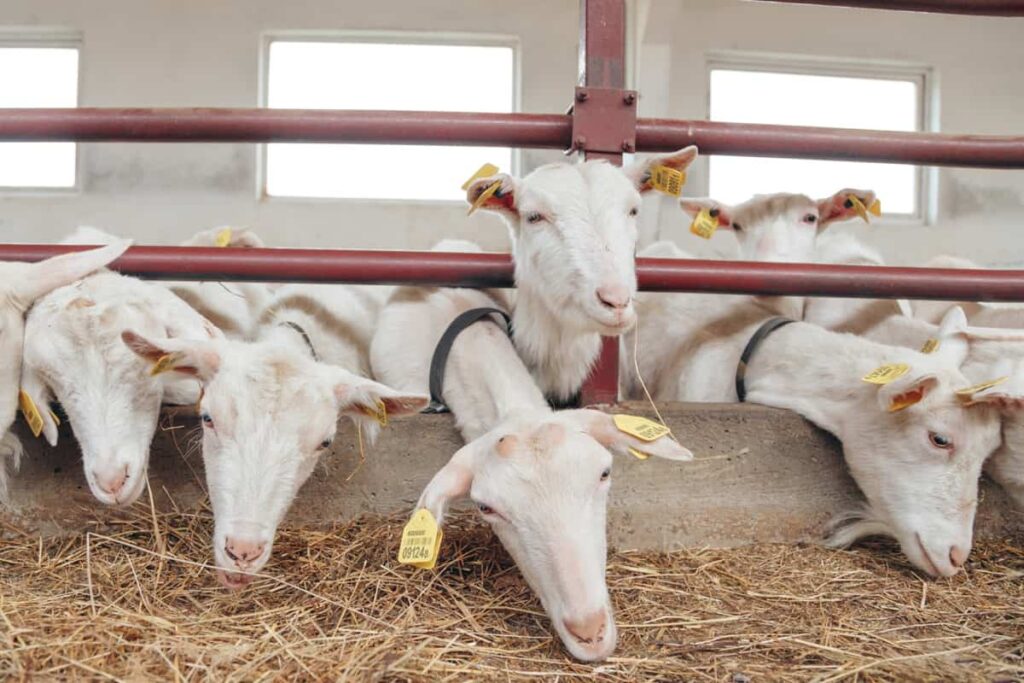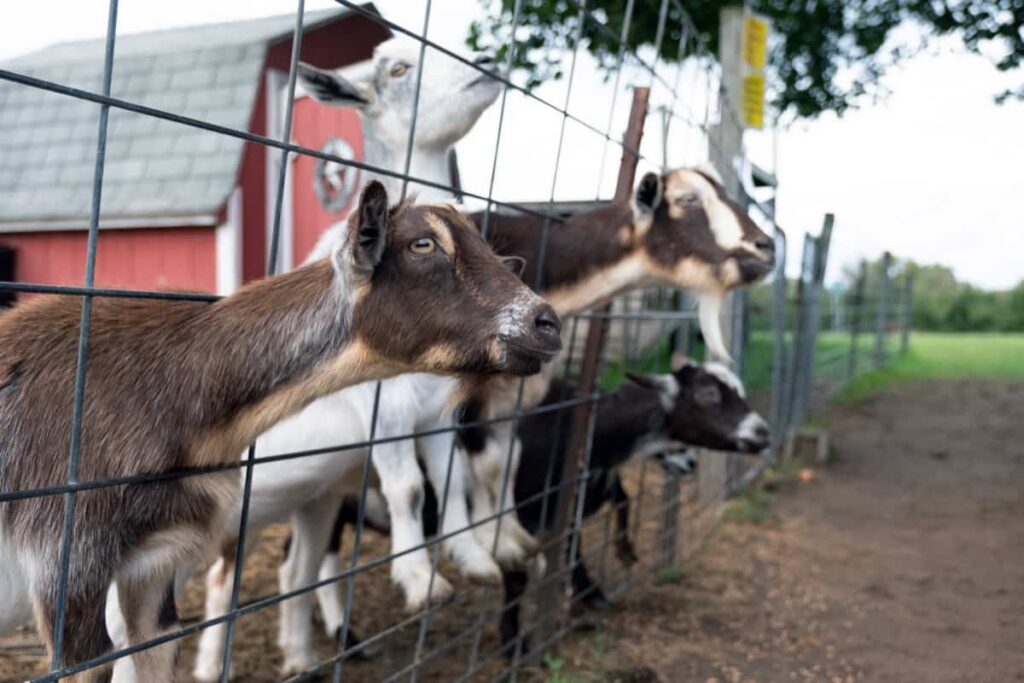Goat farming involves raising goats for multiple purposes, such as meat, milk, and fiber. They are known to be versatile animals that require minimal space and maintenance while providing numerous benefits. Today, they are bred worldwide due to their adaptability and easy management. Furthermore, goats have a high reproductive rate, meaning they can produce several kids yearly, increasing farmers’ profits. Let’s check out goat farming advantages below.

Goat Farms Types
There are several types of goat farms, each with its unique purpose and management techniques. One common type is a dairy goat farm, where goats are raised primarily for milk. These farms typically have high-yielding breeds of goats that require specialized milking equipment and strict hygiene practices. Another type of goat farm is a meat goat farm, which raises goats for consumption.
Meat goat breeds include Boer and Kiko goats, among others. These farms usually require less specialized equipment but adequate pasture space to allow the animals to graze freely. Fiber goat farming involves raising specific breeds, such as Angora or Cashmere goats, for wool or mohair fiber production. These animals require regular shearing and special care to maintain the quality of their fibers.
Goat Farming Advantages
Minimal Space is Required
Unlike other livestock animals, such as cows or horses, goats don’t need much land to roam around on. You can raise several goats in a relatively small area. This makes goat farming an ideal option for those living in urban areas or with limited space. It’s possible to keep goats in your backyard or rooftop. Goats can thrive anywhere if they have access to fresh water and food. Another benefit of raising goats in a small space is that monitoring their health and behavior is easier. You’ll be able to keep track of each animal more easily than if they were spread out across a large pasture.
Feeding Needs are Less
Goats can survive on various feed options, including grasses, hay, and weeds. Goats have a unique digestive system that efficiently extracts nutrients from low-quality forage. They require less food than cows or sheep per body weight. You’ll need fewer resources to keep your goats healthy and productive.
Feeding costs take up a considerable portion of any farmer’s budget, but it doesn’t have to be this way with goat farming. Goats prefer browsing over grazing; therefore, they don’t require expensive feeds like grain or soybeans. Goat farming requires significantly less feed than other livestock types while remaining productive and profitable – making it an excellent choice for small-scale farmers looking for ways to reduce costs while maximizing profits through sustainable practices.
Multipurpose Usage
Goats can provide farmers with various products like meat, milk, and fiber. Goat meat is becoming popular due to its lean composition and unique taste. Also, it is high in protein and low in fat compared to other meats. In addition to meat production, goats produce milk for human consumption or transform it into cheese and yogurt.
In case you missed it: Innovative Housing and Shelter Designs for Profitable Goat Farming

This milk is easier to digest than cow’s milk because it has smaller fat globules, making it easier on sensitive stomachs. Another valuable product from goats is fiber. Mohair and cashmere fibers are obtained from certain breeds of goats like Angoras or Cashmeres, respectively. These fibers are highly demanded in the fashion industry and are used for clothing items like sweaters and scarves.
Low Maintenance
Goats are easy to care for and don’t require much attention or resources. Goats can graze on various vegetation, making them less picky eaters than other livestock. This means they can survive where other animals struggle to find enough food. Additionally, goats have strong immune systems, making them less susceptible to diseases and illnesses than other livestock. As long as the goat’s basic needs, such as shelter from extreme weather conditions and clean water, are met, they can thrive with minimal intervention from farmers.
Faster Growth
Goats have a faster growth rate compared to other livestock animals. This means your investment in raising goats can be returned much quicker than if you were raising cows or pigs. Goats typically reach maturity at 12-18 months, depending on the breed and gender. Female goats, also known as does, can give birth to multiple kids per year, allowing for even faster herd expansion.
Easy to Train and Handle
Goats are known for their docile nature, making them ideal for those new to farming. Goats can be quickly trained to follow specific routines, such as coming in at night or going out to pasture during the day. Unlike animals requiring electric fences or complicated housing systems, goats can be confined with simple fencing structures.
High Prolificacy
Goats can breed yearly, resulting in more offspring per breeding cycle. This makes it possible for farmers to increase their herd size quickly and efficiently.
They’re Inexpensive to Keep
Goats require less space and feed. This means that even small-scale farmers can engage in goat farming. Goats are mainly known for their ability to survive on various vegetation and thrive in harsh conditions where other animals would struggle. They have high resistance to diseases and parasites, making it easy for farmers to rear them with minimum veterinary costs. Furthermore, goats do not require expensive housing structures like other livestock do. A simple shed or shelter will protect them from extreme weather conditions or predators at night.
Goats Grow Faster
Goats reach maturity much faster and are ready for breeding at around six months old. This means that farmers can turn a profit on their investment in a short time. Goats can be sold for meat or milk, which is highly valued in many cultures.
Easily Marketable
One of the great advantages of goat farming is that it’s an easily marketable venture. Different products can be derived from goats, such as meat, milk, and fiber. This means there are various markets for goat farmers to sell their products. The versatility of goats as a commodity makes them an attractive investment for farmers looking to enter this industry. Whether you’re selling their meat or utilizing their milk or fibers- there will always be a demand for your product.
In case you missed it: Goat Breeding and Genetics for Improved Productivity and Disease Resistance

Conclusion
Goat farming has gained popularity amongst small-scale farmers as it needs less investment than other agriculture or animal husbandry. Goats also provide an excellent source of income by selling offspring or products like wool. Goat farming is an ideal option for people who want to earn money through sustainable practices while enjoying the company of these friendly creatures.
- Goat Milking Practices and Equipment: A Beginner’s Guide
- Goat Farming for Fiber: Producing Mohair and Cashmere
- Maximizing Goat Milk Production: Tips for Dairy Goat Farmers
- Goat Farming as a Family Business: Strategies for Success
- Profitable Kenya Goat Breeds for Commercial Dairy and Meat Business
- Unlock the Secrets of Oberhasli Goat: Discover Raising and Management Practices
- Ultimate Guide to Myotonic Goats: Explore Profile to Raising
- Unlock the Secrets of Rove Goat: Discover Management Practices
- Ultimate Guide to Malwa Goat: Explore from Origin to Management Practices
I am kindly asking if this information can be sent to my email